Cutting Thin Stained Glass Strips Expertly
One of the more difficult stained glass cutting tasks is cutting small strips without snapping the ends off. Cutting straight lines when they’re very close together can be tricky too if they’re very thin strips. It’s easy to crack the narrow strips of glass and get a poor cut.
This video shows you 3 different methods to help you improve your stained glass cutting so you can cut these thin strips successfully.
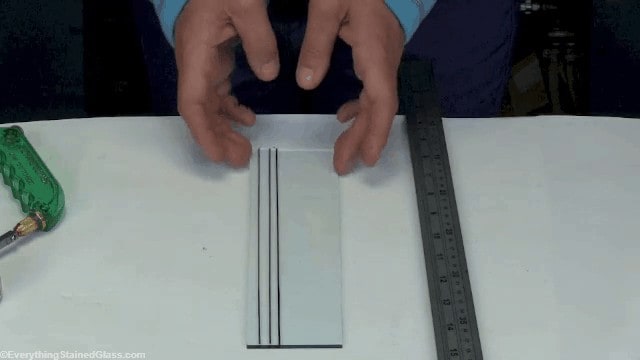
Cutting Methods for Straight Narrow Strips
- Mark the glass and place a ruler over the cutline.
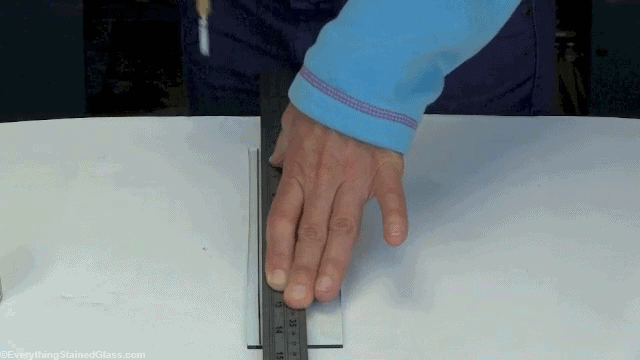
- Make sure the cutter head is in contact with the ruler for the whole length of the cut. This will ensure that the line is straight.
- You can either pull or push the cutter when you’re using a ruler, whatever is best for you. I prefer to pull.
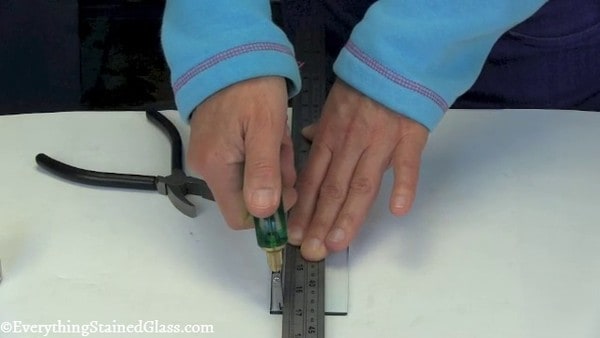
- Using a pair of grozer breaker pliers, gently put downward pressure on one end of the thin strip. Make sure you keep the flat jaw on the top, lined up with the score.
- If the glass doesn’t come apart with gentle pressure, try easing it from the other end and move along easing it apart as you go.
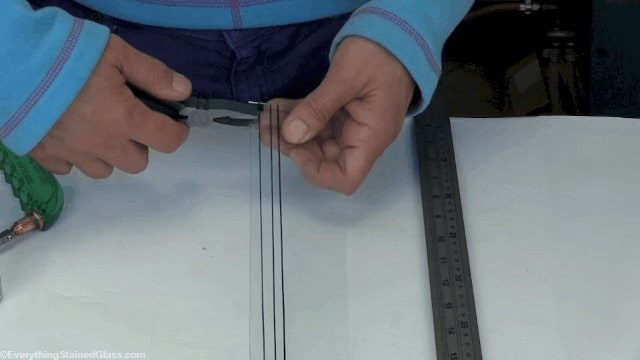
- Start easing it apart at the end rather than the middle. This reduces the chance of a flare and also allows it to run the whole length of the score.
Cutting Pointed Narrow Strips of Stained Glass
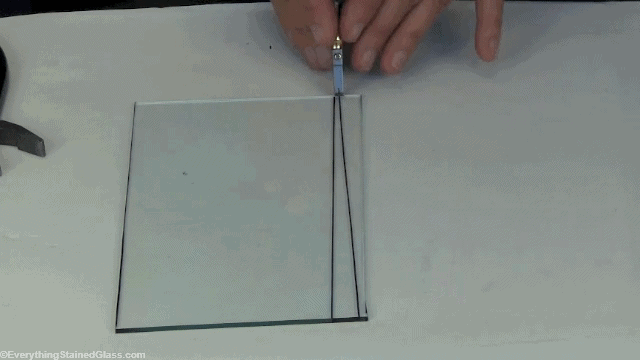
- If the glass goes to a point, start breaking it from the widest part with the grozer breakers.
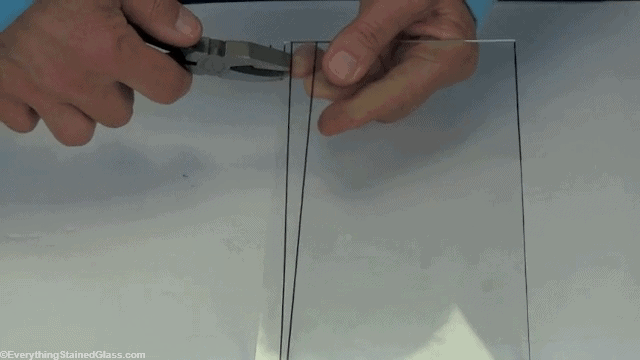
- If your piece glass is hard to break apart from just one end, open it at one end by exerting pressure with the breakers until you hear a click.
- Then repeat this at the other end and it should come off in one thin pointed strip.
Cutting Stained Glass Strips From A Narrow Piece of Glass
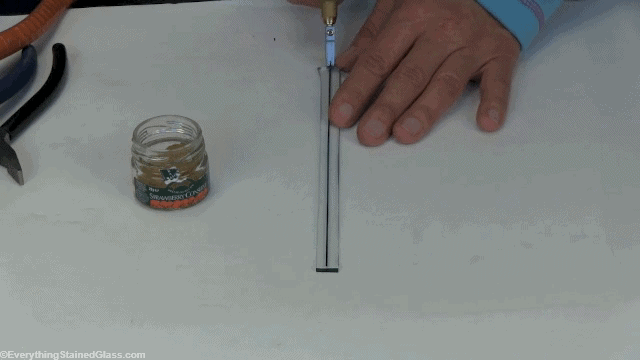
- This is tricky as the narrowness of the glass means that you can’t easily hold it steady. One pair of grozing pliers doesn’t work because you can’t hold it securely enough with your other hand.
- Use 2 pairs of pliers to hold the glass. Use the grozer breakers to snap and pull the glass apart as normal.
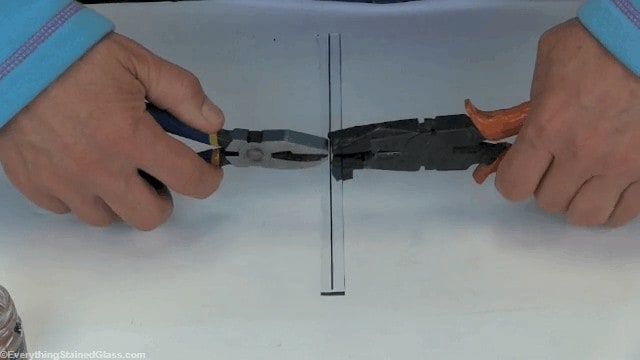
- If you don’t have 2 pairs of grozer breakers you can use a regular pair of pliers.
You can use this same method for cutting pointed strips from a narrow piece of glass.
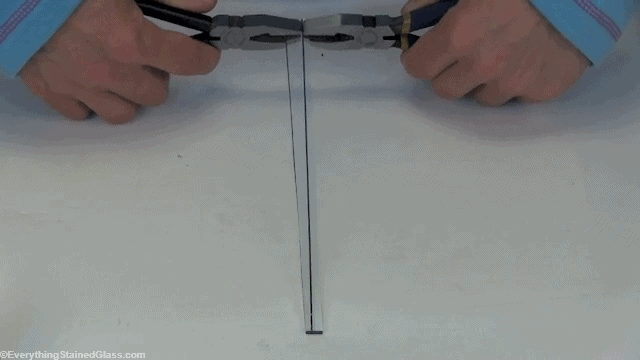
Just gently ease it apart as you did with the straight strips. You don’t have to rush, you have to feel the glass as it’s ready to break and there should be no problem.
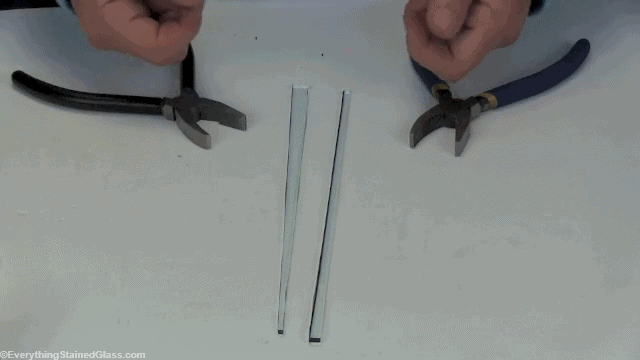
These are my recommended Grozer breaker pliers They are available on Amazon through this link.
Before you click I want to let you know I get a small % if you click through from my website and purchase these pliers. As I hope you know by now, I’m not going to be recommending things I don’t find tip top and incredibly useful. Thanks for your support.
If you’re new to stained glass or coming back to it after a break there are many tips and tricks you can learn to make it easier for yourself.
If you don’t have a local class my Stained Glass Made Perfect course has helped many beginners and refreshers nail the essential techniques and go on to find success with more ambitious projects. The course is self-paced and online so you can learn these techniques even if you can’t easily get to a class. You can find out more about it here Stained Glass Made Perfect.
More Cutting Pointed Strips Methods
Here are some more suggestions for cutting stained glass that goes to a narrow point. They’re kindly offered by my online students. Try them all and see which works best for you 🙂
- The ‘Towel Method’. After you have scored your piece, lay the piece scored side down on a folded tea towel. Fold the towel in fours, then using the metal end of your pencil cutter, gently tap along the score line starting at one end and going to the other end. Works for me every time.
Diane Aubin LaBrie - When I have sharp points I cut the pointed ends just a fraction of an inch away from where the finished piece of glass needs to be. That way I have a little space for those times when the point may not break correctly. And to give myself a little wiggle room I cut a little wider on both sides of the point and grind the excess off.
Gail Koebke - Start from the point first when opening out the score.
Rich Alfieri - Cut the glass about an inch away then score it closer then score the actual piece. Use the Siberschnitt breakers, turn the rubber piece to the direction of the score line and gently push on it so you hear the glass crack in the middle and on both ends.
Regina Seaman
If you have a way of cutting these strips that we don’t know about, feel free to add them in the comments below. The more the merrier. Thanks.
Go here for more cutting tutorials.
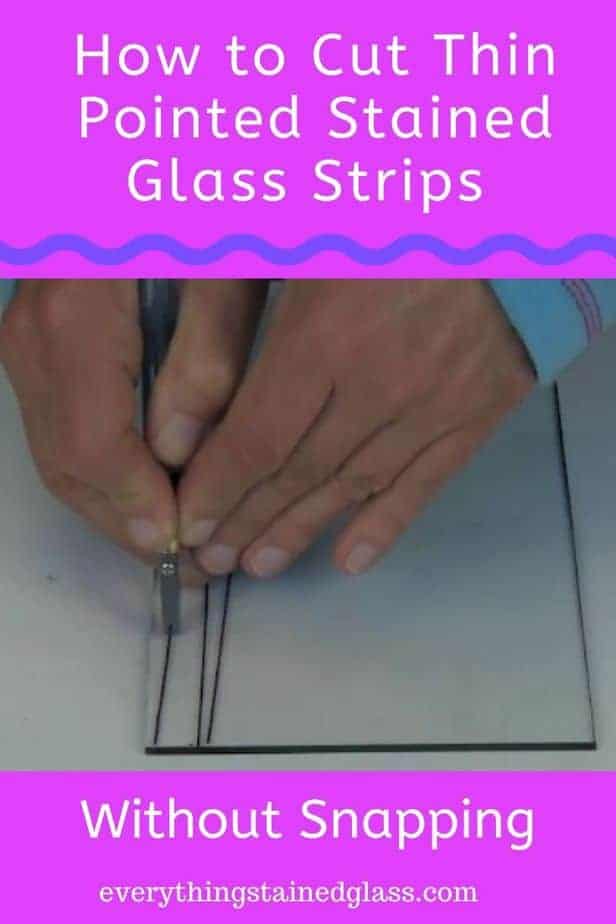



1. I suppose you could use ice – rub the opposite side from the score line, that will shrink it and therefore expand the side with the score line, tending to deepen the score into a break
2. Could make a tool for this, a channel that fits the glass (like came but stiffer, MAYBE zinc came) so you put the channel over the thin strip, then grab the channel with the pliers and it will spread the force over the whole score line and not just the part near the pliers
I’ve never heard of this Rod but it sounds an ingenious suggestion. If a little complicated 😉 You could give it a go and report back 🙂
Thank you again for your wonderful tips!
I do some kind of needlle for vintage cadran or cou cou
normaly it begin
by just find some kind of needel in the scrapp box at school
lot of beautifull nedle there
very difficul to make the hole for the cou ou
It’s a bit tricky to understand due to the language differences Jacques. I think you mean vintage clock/cuckoo clock but not sure what you mean about the hands.
Thanks for adding your thoughts and sorry that we can’t communicate easily
Milly,
Thank you for sharing your knowledge with us. I always learn from your video’s and emails. You make it look so easy. I’m stubborn and try but it takes me a lot longer to complete a task than you.. I’m still trying the long thin cuts, use the first aid kit for the cuts and now I am able to see a video!! The curved thin cuts are intimidating. I especially like the sections when you say, “lets try it this way”
Donna Abbe
Great to know that the videos are helpful for you Donna, thanks for taking the time to let me know 🙂
Why don’t you just use running pliers?
The width of the running plier jaw doesn’t fit on the narrow strips of glass. Thanks for your question Lynn, I hope that explains it.
What about pointed strips with a curve? I find them really difficult. Planning to make Escher’s sphere in the future, so will need that trick badly.
Good point Berna (bad pun!) The same principles apply. Silberschnitt Running Pliers are good for applying pressure at different points along the score – you can see how the pliers work here.
you make it look so easy as usual, but it’s not as we know but it certainly gives us confidence to try it and hope that we could do it too. Thank you
You can you can Ilona! 🙂 Thanks for commenting.
Thank you. Very useful. It helps me gain confidence in myself.Be full of life and healthy !!!
That’s a nice message for a Monday morning Ilie, thank you 🙂
Milly, another wonderful video to teach us tricks to doing difficult things!!!
I wish I had the talent and ability that you have to cut such long and thin strips of glass.
I guess I need a lot more practice, or maybe a big dose of good luck.
THANKS!!!
I think you probably do have the skill Gail 😉 Thanks for your kind comments.
What is your cutting surface? I always have trouble with my glass sliding a bit when I’m cutting, particularly on the small pieces.
Here (for the purposes of the video so that you can see clearly) I have put white paper over my normal cutting surface – lino on the workbench. If you turn the lino over it’s less shiny and slippery. It has a bit of give too, which is helpful when cutting glass.
I hope that helps.
Thank you Milly . You make it look foolproof .
👍
Barbara.
You’re welcome Barbara 🙂